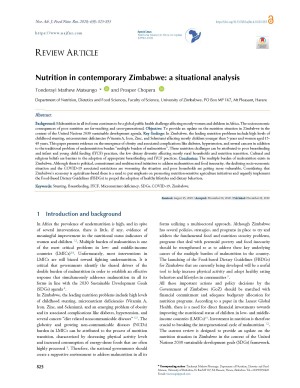Nutrition in contemporary Zimbabwe: a situational analysis
Abstract
Background: Malnutrition in all its forms continues to be a global public health challenge affecting mostly women and children in Africa. The socioeconomic consequences of poor nutrition are far-reaching and cross-generational. Objective: To provide an update on the nutrition situation in Zimbabwe in the context of the United Nations 2030 sustainable development agenda. Key findings: In Zimbabwe, the leading nutrition problems include high levels of childhood stunting, micronutrient deficiencies (Vitamin A, Iron, Zinc, and Selenium) affecting mostly children younger than 5 years and women aged 15-49 years. This paper presents evidence on the emergence of obesity and associated complications like diabetes, hypertension, and several cancers in addition to the traditional problem of undernutrition burden “multiple burden of malnutrition”. These nutrition challenges can be attributed to poor breastfeeding and infant and young child feeding (IYCF) practices, the low dietary diversity affecting mostly rural households and nutrition transition. Cultural and religious beliefs are barriers to the adoption of appropriate breastfeeding and IYCF practices. Conclusion: The multiple burden of malnutrition exists in Zimbabwe. Although there is political, commitment and multisectoral initiatives to address malnutrition and food insecurity, the declining socio-economic situation and the COVID-19 associated restrictions are worsening the situation and poor households are getting more vulnerable. Considering that Zimbabwe’s economy is agriculture-based there is a need to put emphasis on promoting nutrition-sensitive agriculture initiatives and urgently implement the Food-Based Dietary Guidelines (FBDGs) to propel the adoption of healthy lifestyles and dietary behaviors.
Full text article
Authors
Copyright (c) 2020 Authors

This work is licensed under a Creative Commons Attribution 4.0 International License.
-
Attribution — You must give appropriate credit, provide a link to the license, and indicate if changes were made. You may do so in any reasonable manner, but not in any way that suggests the licensor endorses you or your use.
-
No additional restrictions — You may not apply legal terms or technological measures that legally restrict others from doing anything the license permits.





